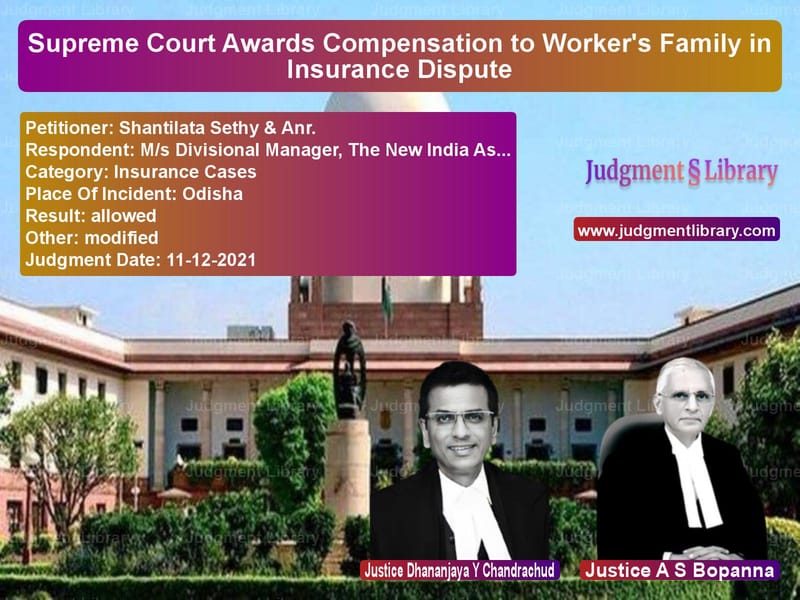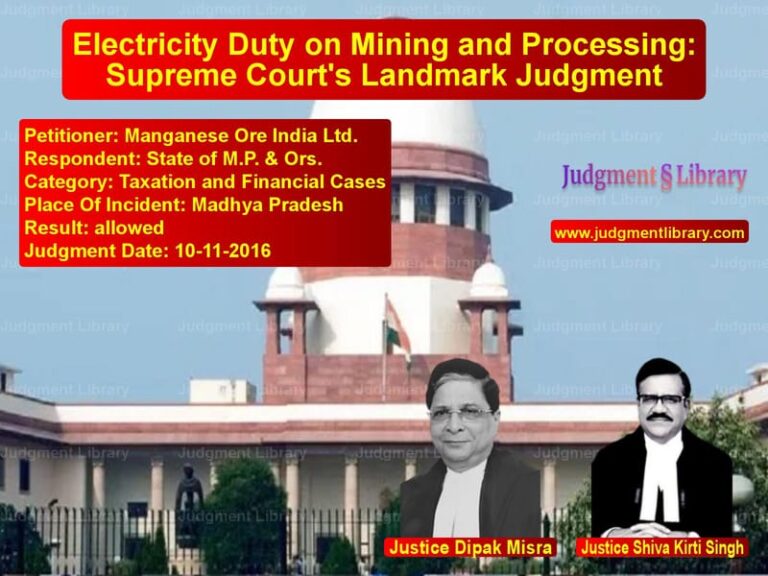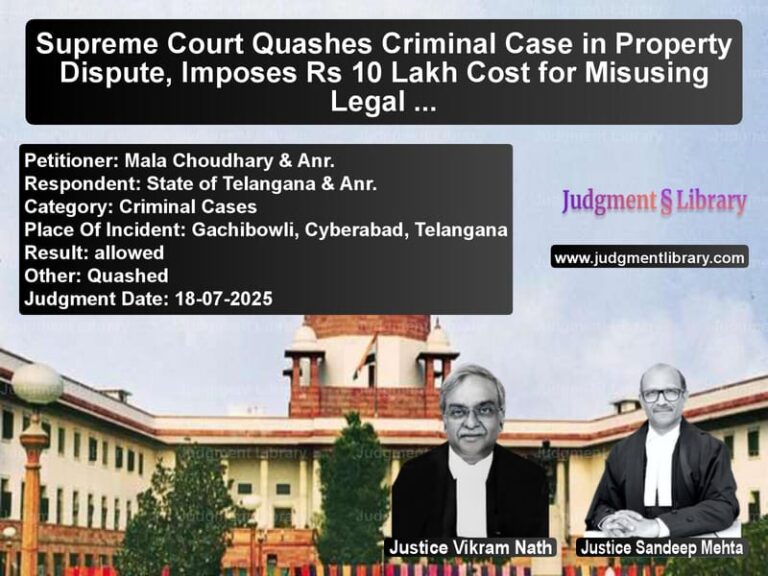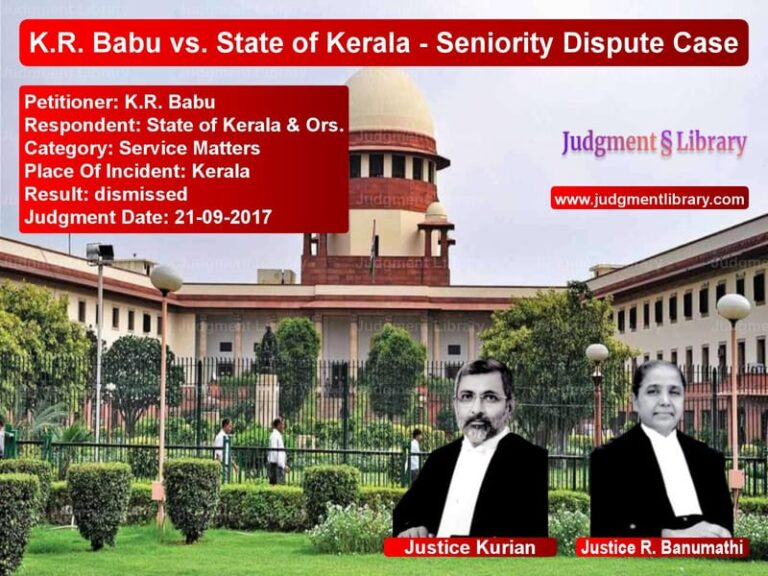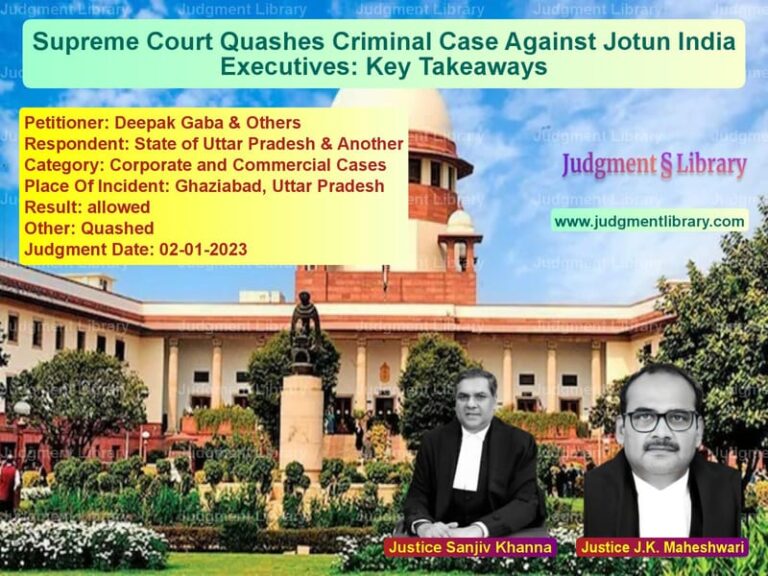Supreme Court Awards Compensation to Worker’s Family in Insurance Dispute
The case of Shantilata Sethy & Anr. vs. M/s Divisional Manager, The New India Assurance Company Ltd. & Anr. revolves around the rights of a deceased worker’s family to receive fair compensation under the Workmen’s Compensation Act, 1923. The Supreme Court ruled in favor of the appellants, restoring the compensation amount initially awarded by the Commissioner and criticizing the insurer’s conduct in prolonging the litigation.
Background of the Case
The deceased workman, son of the appellants, was employed as a helper in a truck belonging to the second respondent, his employer. The truck was insured with the first respondent, The New India Assurance Company Limited. On October 30, 2004, while traveling from Paradeep to Jadupurgoda, the truck driver arranged to transport rice bags on the return trip to Chandikhol. The driver instructed the deceased to get down and prepare for loading the rice bags when the truck lost control and struck him against a tree. The workman succumbed to his injuries the next day.
The appellants filed for compensation under the Workmen’s Compensation Act, claiming Rs. 3,00,000. The employer admitted that the deceased was earning Rs. 2,400 per month plus Rs. 25 daily as food expenses. The Commissioner awarded a total compensation of Rs. 2,64,895 with 12% interest from the date of the accident.
Read also: https://judgmentlibrary.com/supreme-court-dismisses-appeal-in-gujarat-eye-surgery-negligence-case/
High Court’s Decision
The insurance company challenged the award, and the Odisha High Court reduced the compensation to Rs. 1,98,807.70 by lowering the monthly wage calculation. It also reduced the interest rate from 12% to 8%, stating that interest should be applicable only from the date of the award, not from the accident date.
Supreme Court’s Analysis and Judgment
Failure of the High Court to Consider Legal Provisions
The Supreme Court found the High Court’s reasoning flawed and noted that the employer had admitted the worker’s salary, making the wage reduction arbitrary. The Court emphasized that:
“The High Court has completely failed to consider that the award of interest is governed by Section 4(A) of the Workmen’s Compensation Act.”
Unjustified Reduction of Compensation
The Supreme Court held that the High Court had no basis to reduce the compensation, as the claim of Rs. 2,400 per month was neither exaggerated nor disputed. The Court ruled:
“There was absolutely no basis for the High Court to reduce the award on the ground that there was no material to establish the salary that the deceased was earning at the time of the accident.”
Interest from the Date of the Accident
The Supreme Court reaffirmed that compensation must carry interest from the date of the accident, citing the ruling in North East Karnataka Road Transport Corporation v. Sujatha. It held:
“The employer becomes liable to pay compensation as soon as the personal injury is caused to the workman in the accident which arose out of and in the course of employment.”
Criticism of the Insurer’s Conduct
The Court strongly criticized the insurance company for dragging the case to the High Court over a small compensation amount, stating:
“When will a high and mighty state-owned insurance company realize its social conscience? Our conscience has been deeply disturbed by the manner in which a farmer and his spouse have been left to the mercies of legal procedure.”
Final Judgment
The Supreme Court restored the original compensation amount and directed:
- The insurance company must pay Rs. 2,62,164 plus 12% interest from the date of the accident.
- The balance must be paid within one month.
- The appellants shall receive an additional Rs. 1 lakh in costs for litigation expenses.
Key Takeaways from the Judgment
- Workers’ compensation claims must be honored: Employers and insurers cannot arbitrarily reduce compensation.
- Interest applies from the date of the accident: Compensation delays should not penalize victims’ families.
- Courts must uphold social justice principles: The Supreme Court reinforced the need for prompt compensation.
- Litigation should not burden poor families: The ruling criticized unnecessary legal battles against disadvantaged claimants.
- Insurance companies must act responsibly: The Court condemned the insurer for prolonging the suffering of the deceased’s parents.
Conclusion
This judgment reinforces the principle that compensation under the Workmen’s Compensation Act must be fairly determined and promptly disbursed. The Supreme Court’s ruling ensures justice for victims’ families and upholds the importance of employer and insurer accountability.
Petitioner Name: Shantilata Sethy & Anr..Respondent Name: M/s Divisional Manager, The New India Assurance Company Ltd. & Anr..Judgment By: Justice Dhananjaya Y Chandrachud, Justice A S Bopanna.Place Of Incident: Odisha.Judgment Date: 11-12-2021.
Don’t miss out on the full details! Download the complete judgment in PDF format below and gain valuable insights instantly!
Download Judgment: shantilata-sethy-&-a-vs-ms-divisional-manag-supreme-court-of-india-judgment-dated-11-12-2021.pdf
Directly Download Judgment: Directly download this Judgment
See all petitions in Insurance Settlements
See all petitions in Other Insurance Cases
See all petitions in Judgment by Dhananjaya Y Chandrachud
See all petitions in Judgment by A. S. Bopanna
See all petitions in allowed
See all petitions in Modified
See all petitions in supreme court of India judgments December 2021
See all petitions in 2021 judgments
See all posts in Insurance Cases Category
See all allowed petitions in Insurance Cases Category
See all Dismissed petitions in Insurance Cases Category
See all partially allowed petitions in Insurance Cases Category

